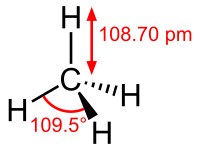
Photo from wikipedia
This study was designed to propose alternative therapeutic compounds to fight against bacterial pathogens. Thus, a library of nitrogen-based compounds bis(triazolyl)methane (1T–7T) and bis(pyrazolyl)methane (1P–11P) was synthesised following previously reported… Click to show full abstract
This study was designed to propose alternative therapeutic compounds to fight against bacterial pathogens. Thus, a library of nitrogen-based compounds bis(triazolyl)methane (1T–7T) and bis(pyrazolyl)methane (1P–11P) was synthesised following previously reported methodologies and their antibacterial activity was tested using the collection strains of Staphylococcus aureus, Enterococcus faecalis, Escherichia coli, and Pseudomonas aeruginosa. Moreover, the novel compound 2P was fully characterized by IR, UV–Vis and NMR spectroscopy. To evaluate antibacterial activity, minimal inhibitory concentrations (MICs), minimal bactericidal concentrations (MBCs), minimum biofilm inhibitory concentrations (MBICs), and minimum biofilm eradication concentrations (MBECs) assays were carried out at different concentrations (2–2000 µg/mL). The MTT assay and Resazurin viability assays were performed in both human liver carcinoma HepG2 and human colorectal adenocarcinoma Caco-2 cell lines at 48 h. Of all the synthesised compounds, 2P had an inhibitory effect on Gram-positive strains, especially against S. aureus. The MIC and MBC of 2P were 62.5 and 2000 µg/mL against S. aureus, and 250 and 2000 µg/mL against E. faecalis, respectively. However, these values were > 2000 µg/mL against E. coli and P. aeruginosa. In addition, the MBICs and MBECs of 2P against S. aureus were 125 and > 2000 µg/mL, respectively, whereas these values were > 2000 µg/mL against E. faecalis, E. coli, and P. aeruginosa. On the other hand, concentrations up to 250 µg/mL of 2P were non-toxic doses for eukaryotic cell cultures. Thus, according to the obtained results, the 2P nitrogen-based compound showed a promising anti-Gram-positive effect (especially against S. aureus) both on planktonic state and biofilm, at non-toxic concentrations.
Journal Title: Scientific Reports
Year Published: 2021
Link to full text (if available)
Share on Social Media: Sign Up to like & get
recommendations!